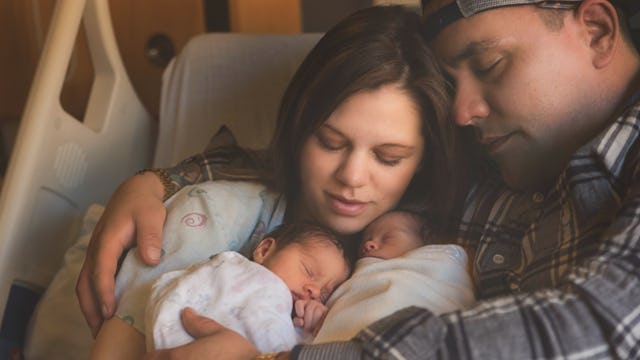Stop Acting Like Contraception Alone Will Fix Poverty

Everything was just about to come together for me when I got pregnant for the first time. I had gotten a long-deserved promotion at my job and was hired for a great paying side gig. Thanks to the anticipated increased income, I found a brand new apartment and was scheduled to move in at the beginning of the next month.
A few weeks later, I was sitting in the social services office, crying because I couldn’t afford food and I didn’t qualify for food stamps. To add insult to injury, the social worker thought that it was a good time to talk to me about safe sex and how to prevent pregnancies. To her, I wasn’t a college educated woman who had already been working for over a decade, paying taxes, and being a positive contributor to society. I was just a poor black woman, “a baby mama,” trying to cheat the system and get “free money.”
It’s heartbreaking the way that poor people are treated in this country. Women, especially moms, have it the worst. In addition to the judgment they face, poor women also deal with blatant intrusion into their private lives. They’re expected to give up the chance to have individual thoughts or feelings regarding everything from how they make money to their reproductive health.
As if having babies is the only reason a woman is living in poverty. That’s the part that really pisses me off. What right does anyone have to tell a woman when or if she should have children? If you’re not rich, you don’t deserve to have a family of your own?
Kids are expensive, certainly. I won’t debate that fact. A woman exercising her right to choose to become a mother is not the cause of poverty in America, though. You know what is? Lack of accessibility to physical and mental health care. Inadequate resources to teach money management and job readiness. Social privileges such as race, nepotism, and generational wealth that some folks never even had a chance at keep the wealthy rich and leave poor folks out in the cold. Literally.
Being educated about and having access to contraception is a good thing, though. No one’s arguing that. According to Upstream, an organization that partners with health centers across the country to remove the barriers of access to birth control, half of the pregnancies in the U.S. are unplanned. They say that the rate of unplanned pregnancies among impoverished women is five times that of women with greater financial means.
That’s definitely a problem, and one that Upstream and other organizations are working to address. Unplanned pregnancies due to lack of access to contraception is counter to the idea of pro-choice. But still, pregnancy, planned or not, is not the cause of poverty. Making sure all women who want birth control are able to receive it is a solution to unplanned pregnancies, but it’s not going to magically make poor people go away.
You might be wondering where this is even coming from. Well, in a recent New York Times article, the author Margot Sanger-Katz questioned whether contraception might be the key to reducing poverty. She profiles Upstream who is currently working with Delaware to implement their program in health centers in the state. It’s clear from coverage of the program that long-acting reversible contraceptives (or LARC), such as IUDs, are their default birth control suggestion, although they do offer any kind that a woman might be interested in. And they give access to it the same day.
Awesome, right?
The challenge is, if what the article says about poor moms is correct–“Mothers of unplanned children tend to give birth when they are younger, leave school earlier and earn less when older”–is pressuring them to insert a LARC without adequate time to understand the risks and to think about whether it’s the right option for her fair? Are they taking away her opportunity to make an informed decision about her contraceptive choices by leading with the LARC and encouraging her to make a decision that day?
It’s a slippery slope to police the wombs of poor women under the guise of charity. Organizations like Upstream and other social service programs have to be diligent about the way the message of their work is shaped and not let conservatives take their positive goal and use it as a weapon against moms who are living in poverty. They have to be careful of being helpful and informative rather than suggestive when it comes to promoting LARC as the first and most viable choice for every woman who walks into the clinic.
Of course, access to affordable health care, including contraception, is critical, but the idea that contraception is the “magic pill” to reduce poverty shouldn’t even be a conversation until we’ve increased minimum wage, closed the gender wage gap, and there are affordable child care options available for moms who want to work. Or until we figure out how to support moms like I was, who were working but weren’t being paid a fair wage.
Not having money is what makes people poor–not babies. Taking away the autonomy of their bodies and treating impoverished women like animals who need to be “fixed” can be detrimental to their sense of self. If we’re truly concerned about ending the circle of poverty, it starts with empowering moms and respecting them as thoughtful and responsible citizens who can make important decisions about their families without outsiders intervening.
This article was originally published on